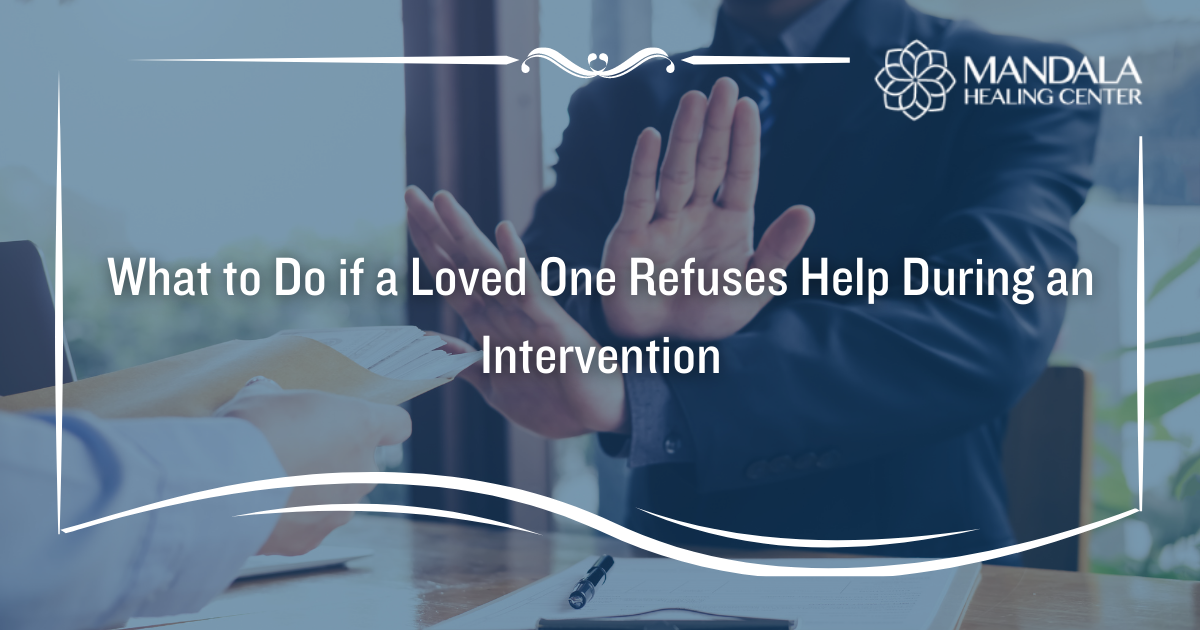Watching someone you love struggle with an addiction to drugs or alcohol can be devastating. You likely understand the anxiety, frustration, and hopelessness that can come with seeing a loved one move deeper into addiction.
Most people want to help their loved ones. You may worry, have difficult conversations, gather support, and then stage an intervention. While your intentions are good, your loved one may refuse the help you offer.
What can you do after your loved one refuses the help you’ve offered during an intervention? Is there anything you can do to encourage your loved one to go to treatment, or should you simply give up?
Many people face this dilemma. You know your loved one needs help to overcome their addiction, but they do not want to go to treatment. Understanding some of the common reasons people give for refusing treatment and knowing about available resources can help you understand what to do if your loved one refuses to go to rehab.
If you or someone you love requires addiction treatment or support during addiction recovery, reach out to the Mandala Healing Center specialists today.
Why Do Some People Refuse Help During an Intervention?
Many barriers prevent people from seeking the treatment they need to overcome addiction. Understanding these reasons may help determine what to do if a loved one refuses help during an intervention.
Denial
Denial is a powerful coping mechanism that prevents people from acknowledging the severity of their circumstances. Mental health experts believe that denial is the mind’s way of protecting someone from an overwhelming situation. Denial can allow people to function during immensely stressful times.
Denial can also keep people with addiction from recognizing the condition’s negative impact on their life. People in denial about their addiction may continue to abuse substances, despite the severe harm to their relationships and health. While those around the addicted person can see the devastation, the addicted person living in denial cannot.
Often, someone in denial about their addiction may need to experience a life-altering event, such as an accident, loss of a relationship, or a severe medical condition, to break through the denial and accept help.
Fear of judgment
The stigma surrounding addiction can make people hesitant about seeking treatment. In many cases, the addicted person may feel embarrassed or ashamed of their addiction. Accepting help means admitting that they are no longer in control of their substance use. This can feel too vulnerable or scary for many.
It’s essential to stay focused on the addicted person’s future, not their past behavior. This can feel challenging, especially if your loved one’s past actions have hurt you.
Financial concerns
Addiction treatment can effectively give people a new chance at a healthy, fulfilling, sober life. Comprehensive treatment programs address addiction’s emotional, physical, and behavioral aspects and are an investment of time, energy, and money.
Many people feel anxious about the cost of substance abuse treatment. They may put off treatment indefinitely. Some refuse treatment during an intervention because they worry about the cost of seeking help. People may also fear losing their job if they take a leave of absence to go to rehab.
It’s important to remember that in many cases, a person’s employment is protected by the Americans with Disabilities Act (ADA) and the Family Medical Leave Act (FMLA). These laws prohibit employers from firing workers who take leave to attend addiction treatment.
Fear of going to rehab
Sometimes, people may simply fear what rehab will be like. Addiction treatment facilities are often portrayed on TV or in movies as dangerous, dreary, hopeless places. In reality, treatment centers are usually calm, supportive environments staffed by caring, compassionate specialists.
It may be helpful to have information about a treatment facility available for your loved one or to tour the facility before beginning treatment.
What to Do if a Loved One Refuses Help During an Intervention
While planning an intervention, your group should make a collective decision about what boundaries you’ll hold if your loved one refuses to go to treatment. You must keep these boundaries if your loved one does not start treatment.
It’s essential to avoid enabling your loved ones if they do not want to seek treatment. Al-Anon, a support group for families of alcoholics, has helpful guidelines for supporting a person with addiction without enabling them. They are:
- Don’t suffer because of the actions or reactions of others.
- Don’t allow yourself to be used or abused to support another person’s recovery.
- Don’t do something for someone that they can do themselves.
- Don’t manipulate a situation to get someone to do something to care for themself, such as go to bed on time or take medication.
- Don’t cover up for your loved one’s mistakes or misdeeds.
- Don’t create a crisis.
- Don’t prevent a crisis if it is the natural course of events.
Following these rules can help you avoid enabling your addicted loved one and hold them accountable for their behaviors.
Loving someone with an addiction is very challenging, especially if they refuse to seek help. You must also find your own support. This could be family therapy, individual counseling, or group support.
Lastly, if you did not hire a professional interventionist to help you stage the failed intervention, consider doing so and trying again. A trained interventionist can offer valuable insight and support before, during, and after an interventionist. Research shows that professionally-staged interventions are more likely to be effective.
Get Help Now
If you or someone you love require substance abuse treatment or support during recovery, contact the Mandala Healing Center staff today.












